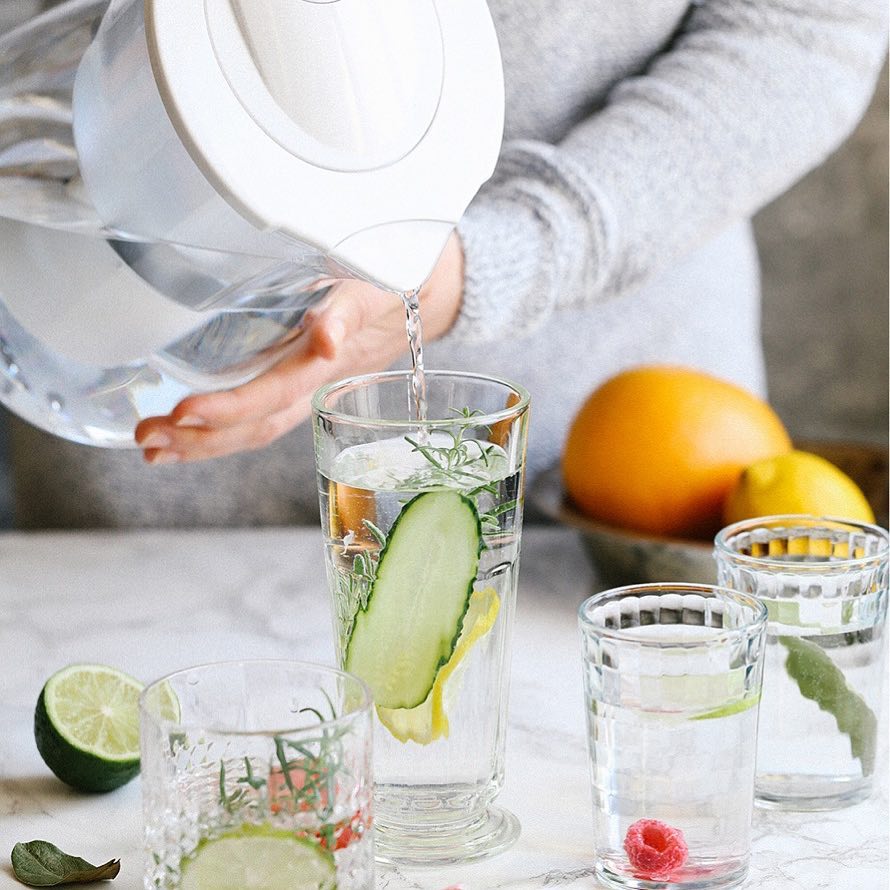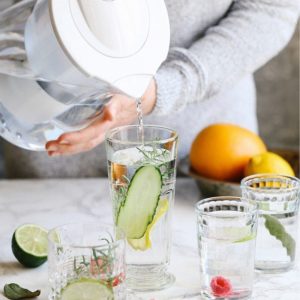This post is also available in:
 English
English  Italiano (Italian)
Italiano (Italian)
Choosing between bottled water and filtered tap water is much more than a matter of taste—it impacts your wallet, well-being, and the environment. This article reveals how much you could save over the next five years by choosing the most suitable filtration system for your household.
Why Discuss Filtered Water Today?
In 2026, households across Europe and the UK are rethinking their consumption habits. Rising prices, growing environmental sensitivity, and a need for practical solutions have led thousands to reconsider tap water as a sustainable, affordable alternative to bottled water.
Europe ranks among the highest per capita bottled water consumers, with several hundred euros spent per year and millions of tonnes of plastic generated. The good news: filtration technology today is accessible, effective, and affordable for anyone—families, DIYers, healthy lifestyle enthusiasts, and plumbing professionals.
Bottled Water: What Does It Really Cost?
Surprising Numbers
- According to industry surveys, bottled water can cost up to 2,000 times more than tap water in the UK and Europe.
- Tap water (Europe/UK average): €0.0038 per litre
- Bottled water (supermarket): €1.30–€1.80 per litre (UK ~£1.10, Germany €1.50, France €1.43)
- Bottled water (café/station): €3–€5 per litre
What This Means for a Family
A typical European family of four drinks about 3,000 litres per year. Buying bottled water at supermarkets adds up to around €900/year, or €4,500 over five years. The cost rises dramatically when buying at stations or cafés.
- Wasted time: frequent shopping trips
- Physical effort: transporting heavy cases
- Storage: home space taken
- Environmental impact: production, shipping, disposal of plastic
Filtered Tap Water: Your Options
Tap water across Europe and the UK is strictly treated, safe, and high quality. For those who dislike chlorine taste or want extra peace of mind, home filtration systems offer practical, sustainable, and affordable solutions.
1) Water Pitcher (e.g., Aquaphor Smile)
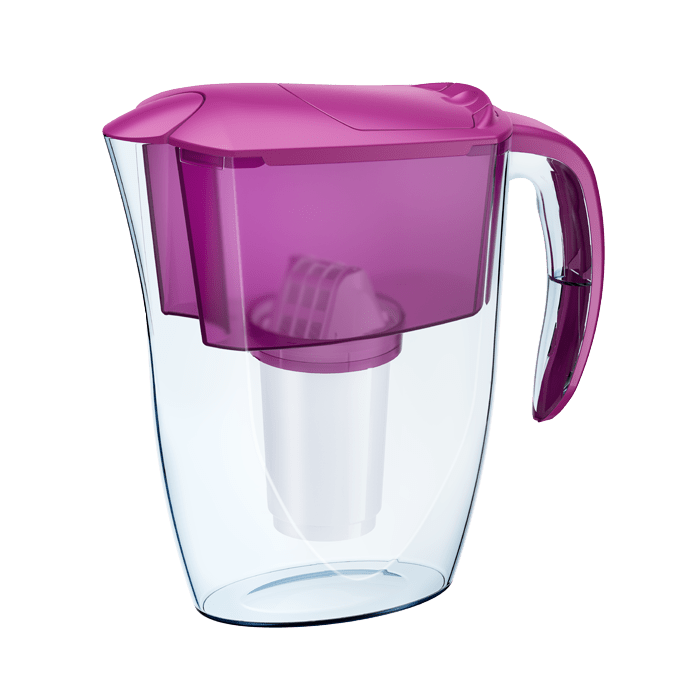
How it works: Tap water passes through a replaceable carbon filter, removing chlorine, heavy metals, and odors. Some models add healthy minerals like magnesium.
Ideal for: Singles, couples, renters, beginners
- Example: Aquaphor Smile Pitcher
- Capacity: 2.4 litres
- Filter life: 350 litres (~2 months for a family)
- Filter price: €7–€8 (packs of 2 for €14)
- Adds magnesium for taste and health
Pros: Low initial cost (€25–€30), no installation, compact, perfect for renters
Cons: Frequent filter replacement, manual filling, limited capacity
2) Tap-Mounted Filter (e.g., Aquaphor Modern)
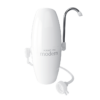
How it works: Mounts directly to the kitchen tap. Filters flowing water instantly.
Ideal for: Small/medium families, practical users, DIYers
- Example: Aquaphor Modern Tap Filter (tool-free installation)
- Filter life: 4,000 litres (~6 months)
- Replacement cartridge: ~€24 (2-pack)
Pros: Filtered water always available, simple installation, space-saving, effective for chlorine/sediment
Cons: Slightly reduced flow, not for very high volumes
3) Under-Sink Filter (e.g., Aquaphor Crystal)
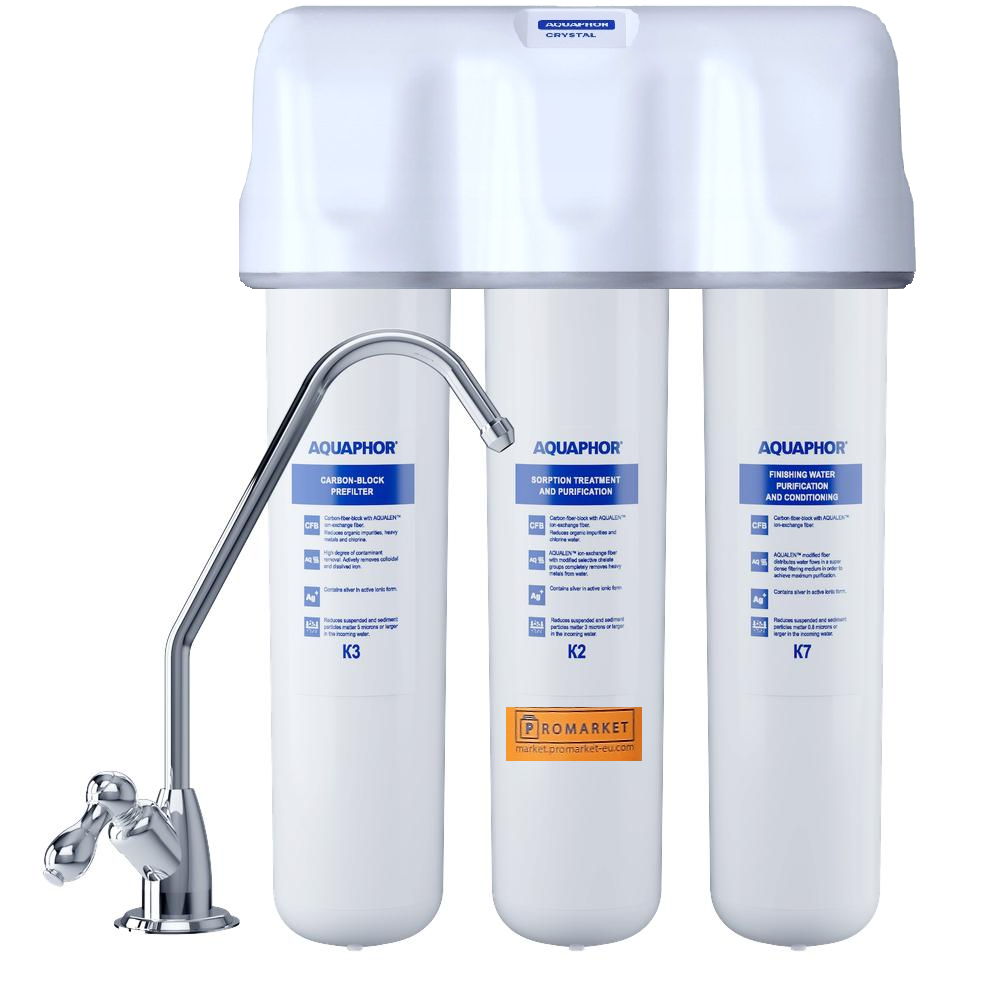
How it works: Multi-stage filtration installed under the sink delivers purified water via a dedicated faucet.
Ideal for: Large families, offices, healthy lifestyle fans
- Example: Aquaphor Crystal Under-Sink (three modules for deep filtration)
- Filter life: 6,000–8,000 litres/year
- Replacement set: ~€47/year
- Removes chlorine, metals, pesticide residues, bacteria
Pros: High-capacity, always-ready purified water, professional-level filtration, annual filter changes
Cons: Requires plumbing skills/pro installation, higher upfront cost (€140–€160)
4) Direct-Flow Reverse Osmosis (e.g., RO C500)
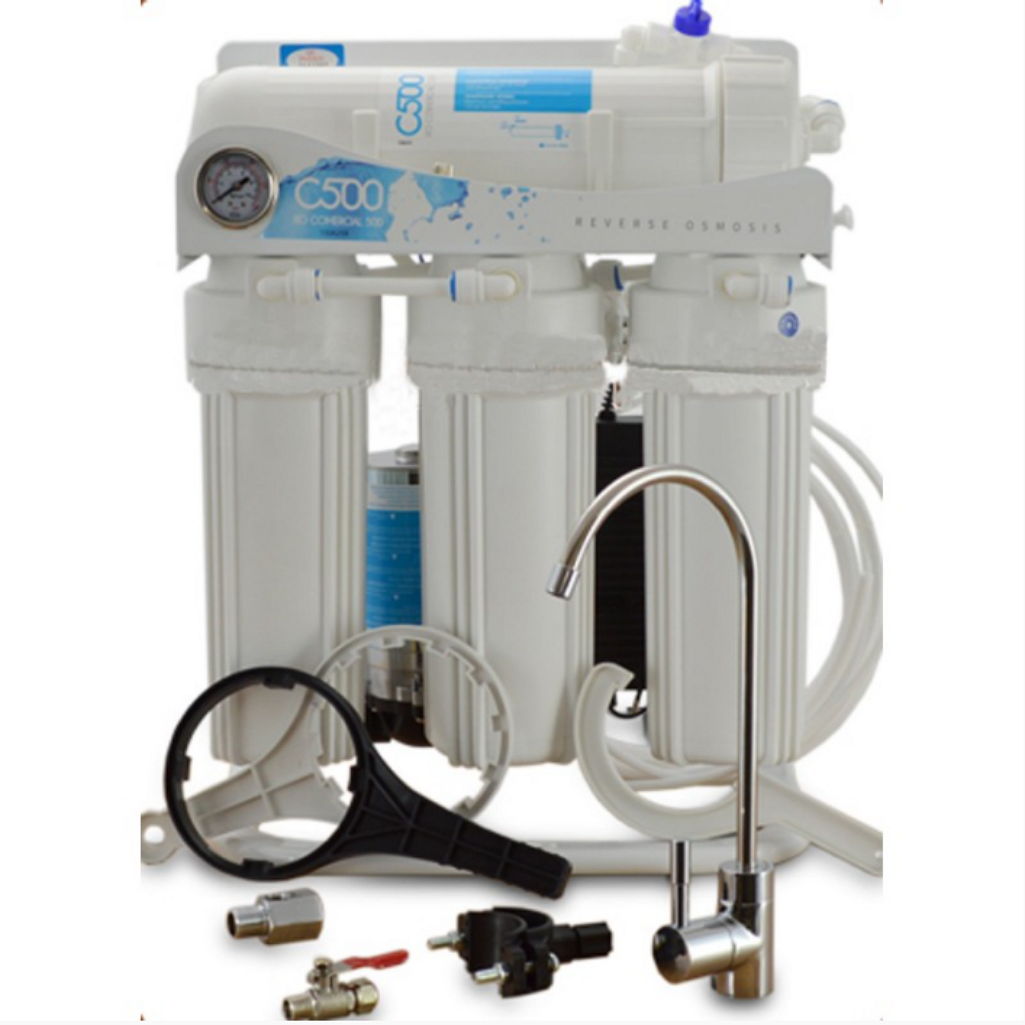
How it works: Uses membrane technology to remove up to 99% of contaminants, including nitrates, viruses, heavy metals, and microplastics.
Ideal for: Very hard or polluted water zones, families with very high health standards, sports enthusiasts, babies
- Capacity: Up to 1,500 litres/day
- Stages: Four filtration stages + RO membrane
- Replacement kit: ~€32/year + membrane (~€50 every 2 years)
Pros: Maximum purity, best for problematic water, great for baby formula and cooking, long-lived components
Cons: High initial investment (€350–€400), requires pro installation, small water waste (efficient modern systems)
5-Year Cost Comparison: The True Numbers
For a four-person European family drinking 3,000 litres/year:
| System | Initial Cost | Cost/Litre | Annual Cost | 5-Year Cost | % Savings vs Bottled |
|---|---|---|---|---|---|
| Tap water (no filter) | €0 | €0.0038 | €11 | €57 | 98.7% |
| Aquaphor Smile pitcher | €25 | €0.035 | €25 | €150 | 96.7% |
| Aquaphor Modern tap filter | €45 | €0.012 | €30 | €195 | 95.7% |
| Aquaphor Crystal under-sink | €140 | €0.006 | €47 | €375 | 91.7% |
| RO C500 reverse osmosis | €390 | €0.015 | €70 | €740 | 83.6% |
| Bottled water (supermarket) | €0 | €0.30 | €900 | €4,500 | — |
| Bottled water (café/station) | €0 | €3.50 | €10,500 | €52,500 | — |
The Economic Verdict: Even the most advanced filtration system saves thousands of euros compared to bottled water. A simple pitcher like Aquaphor Smile saves around €4,350 over five years.
Environmental Impact: Stop Polluting, Start Saving
Plastic Saved
A four-person family drinking bottled water generates:
- 400–650 PET bottles/year
- 12–20 kg of plastic
- Plastic takes centuries to decompose
Switching to filtration systems eliminates this waste completely.
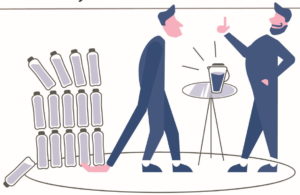
Emissions and Transport
- Oil consumption for plastic
- CO₂ emissions from lorries
- Pollution from non-recycled packaging
A home water purifier cuts your family’s CO₂ footprint by 30–52 kg/year.
European Legislation 2025
EU rules demand that bottles contain at least 25% recycled plastic (30% by 2030). Despite these efforts, over 7 billion beverage containers are still wasted annually across Europe. The most effective solution: not producing single-use plastics—filtering tap water at home.
Health Benefits
Filtered Water with Added Magnesium
Aquaphor filters use magnesium enrichment technology, offering benefits for:
- Cardiovascular health
- Muscle and nerve function
- Nutrient absorption and blood sugar balance
- Reduced stress and anxiety
- Gut health and regularity
Magnesium is vital for over 300 enzymatic reactions. Filtered, magnesium-rich water makes it easy to meet daily needs.
Removing Contaminants
Home filtration systems eliminate:
- Chlorine and volatile organics (better taste/odor)
- Heavy metals (lead, arsenic, copper)
- Pesticides and nitrates
- Bacteria and viruses (reverse osmosis)
- Microplastics
Advantages for Every Target
Families
- Immediate savings
- Safe water for babies/children
- No more heavy supermarket trips
- More space at home (no bottled storage)
- Environmental education for kids
DIYers
- Easy, quick installation (Modern, Smile)
- Simple maintenance (changing filters)
- No special tools for basic models
- Customization options
Healthy Lifestyle Enthusiasts
- Magnesium-enriched water for athletic performance
- Pure hydration without contaminants
- Better taste for beverages, meal preparation
- Improved recovery
Plumbers and Installers
- Growing business opportunity
- Certified, reliable products (Aquaphor)
- Easy access to spare parts: Filter Replacements
- Fast installations, happy clients
Case Study: The Smiths
- Household: 4 people
- Annual water consumption (drinking/cooking): 3,000 litres
- Previous solution: Supermarket bottled water
- Annual spend: €900 + 15 hours lost + 800 kg transported
New solution: Aquaphor Crystal under-sink filter
Results after 3 years:
- Savings: €1,275 (€900 × 3 – €375 spent on filtration)
- Time saved: 45 hours for the family
- Plastic avoided: 1,800 bottles, 54 kg
- Feedback: “The water tastes great, our children drink more, and we’re never going back to bottles!”

Ideal coffee without white coating of calcium salts
FAQ: Frequently Asked Questions
Is tap water in Europe & UK safe?
Yes. Municipal tap water is rigorously controlled and generally safer than many bottled waters, which can pick up microplastics with improper storage.
How often do you change filters?
Pitcher (Smile): every 350 litres (~2 months)
Tap filter (Modern): every 4,000 litres (~6 months)
Under-sink (Crystal): every 6,000–8,000 litres (~yearly)
Reverse osmosis (RO C500): annual filters, membrane every 2 years
Can I install a filter myself?
Yes for pitcher and tap filter (Smile, Modern). For under-sink and reverse osmosis systems, professional installation is recommended.
Is maintenance complicated?
No, it’s mostly scheduled filter changes—many suppliers offer maintenance services.
Does filtering really improve taste?
Absolutely. Filtration removes chlorine and other taste-altering compounds, and magnesium enrichment makes water smoother and tastier.
How long does a filtration system last?
With correct maintenance, for many years—most core components are robust, filters are replaceable.
Can you cook with filtered water?
Highly recommended—better taste for tea, coffee, pasta, baby formula. Reverse osmosis guarantees ultra-pure water for families and babies.
Is it really better for the environment?
Yes — no single-use plastic, reduced emissions, less waste.
Conclusion: The Smart Choice for 2025
- ✅ Save up to €4,350 in five years
- ✅ Healthier, safer, magnesium-rich water
- ✅ Zero plastics, reduced CO₂, no waste
- ✅ Convenience – always available, no heavy lifting
- ✅ Superior taste, customizable filtration
No matter your household type, lifestyle, or profession—there’s an ideal filtration solution for you.
Which Solution to Choose?
- Limited budget, simplicity: Aquaphor Smile Pitcher
- Practicality, DIY installation: Aquaphor Modern Tap Filter
- Large family, professional filtration: Aquaphor Crystal Under-Sink
- Maximum purity, difficult water: RO C500 Reverse Osmosis
Replacements Always Available
Shop original Aquaphor replacements: Filter Replacements & Spare Parts
The future of water is filtered, sustainable, and smart. Start saving and making a difference today.
🌍 Less plastic. 💰 More savings. 💧 Better water.
This post is also available in:
 English
English  Italiano (Italian)
Italiano (Italian)

